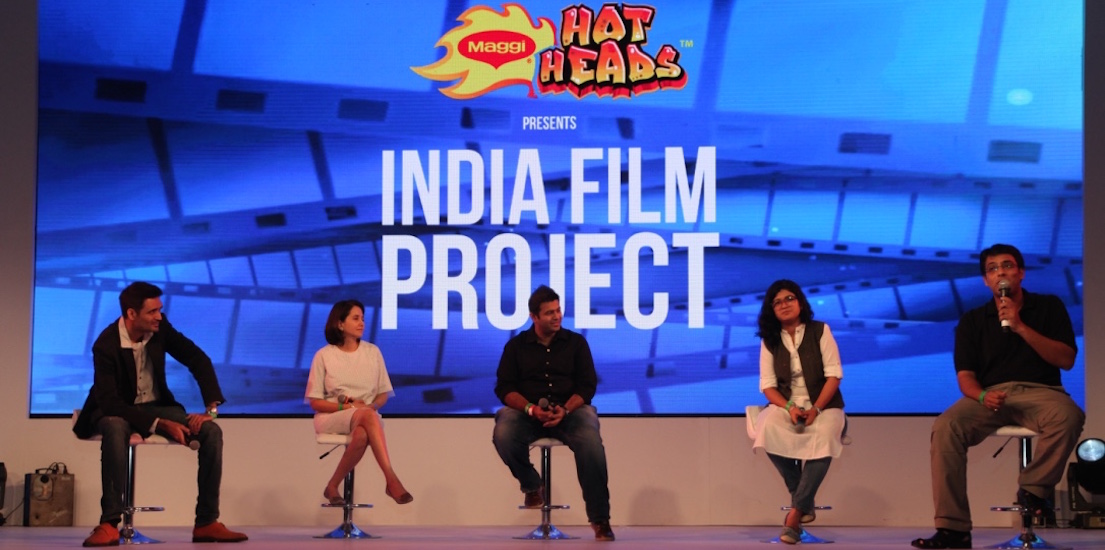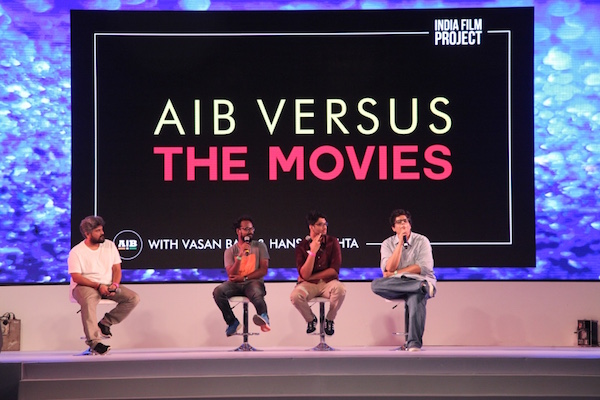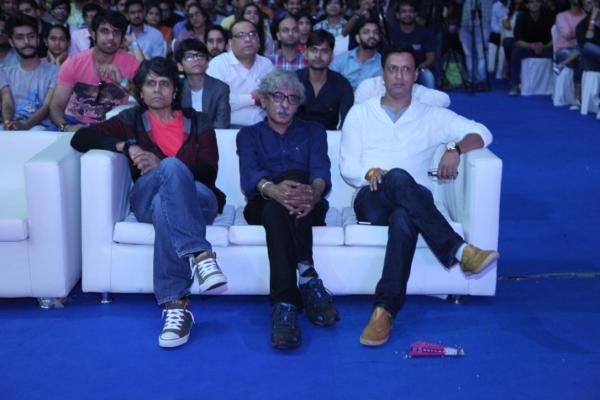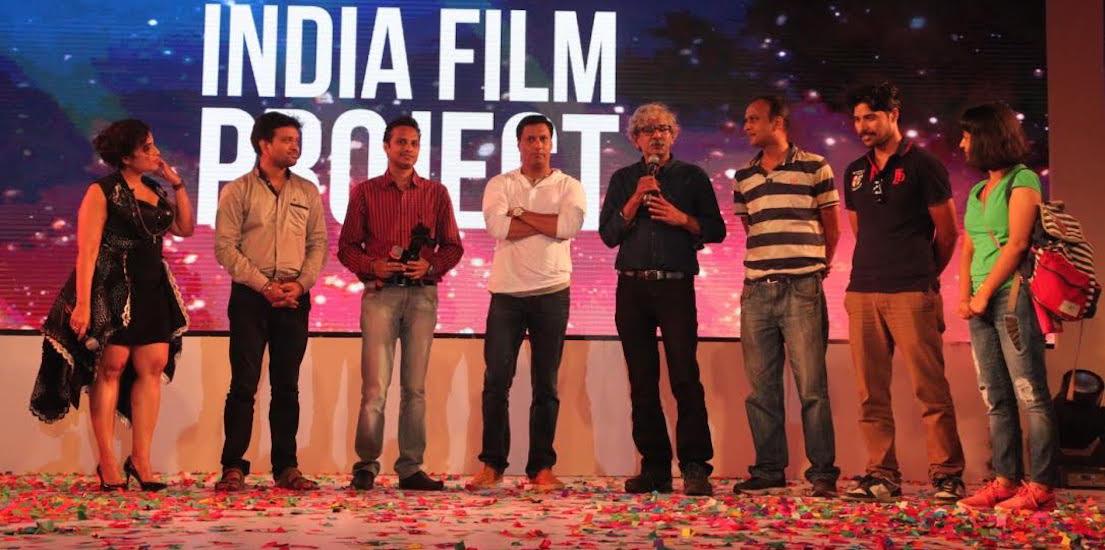India Film Project 2016: A Day Dedicated to Short Films & Web Content
India Film Project 2016 exceeded expectations in more ways than one this year as Asia’s biggest filmmaking challenge. With a whopping 23,600 filmmakers participating in making 1200+ films in under 50 hours, it is safe to say that the vision of Mr Ritam Bhatnagar, founder of the initiative, has been realised: to provide a platform for budding filmmakers and filmmaking enthusiasts — with the challenge, of course, of being able to create a short film from scratch in the given time constraint.

“This is the first year that we’ve shifted the festival venue from Ahmedabad to Mumbai,” he said. “We are extremely happy with the tremendous response received in our sixth edition. People from all over India came to be part of the event. The guests and the audience enjoyed the workshops conducted, making the sessions extremely engaging.”
The turnout at the event on October 1st at the Bombay Convention & Exhibition Centre, Goregaon, was indeed overwhelming, with most of the sessions witnessing a packed house, despite it kicking off on a Saturday morning. With topics ranging from ‘The Making of a Short Film’ to ‘The Anatomy of a Web Series’ to the ‘Importance of Giving Offence’, there was plenty of food for thought for the audience shuffling between the two stages to hear speakers that included established film critics, filmmakers, comedians, and some of India’s leading web content creators.
The Making of a Short Film
Following a talk by the team behind Terribly Tiny Tales on developing story ideas, director of the Terribly Tiny Talkies short film Bapu, Abhishek Sengupta discussed the intricacies of making a short film with interesting tips for budding filmmakers.
“The question you need to ask yourself is — what is it exactly that I am trying to say, and what is the best way to say it?” he said. “Firstly, it’s very important to have a great script that really means something to you. If you’re not honestly invested in your material or subject, you cannot expect others to be, either. Trends are great, but short-lived, and if you’re honest in your filmmaking, it really shows. The second step, is to budget properly. If there’s one thing that I’ve learnt from my own experiences, it’s that you’re always going to be running short of funds. There are always extra or unanticipated expenses, and it’s important to account for them.”
One thing that I’ve learnt from my own experiences is that you’re always going to be running short of funds
Anatomy of a Web-Series with The Viral Fever (Nidhi Bisht and Sameer Saxena), Y-Films (Nikhil Taneja) and The Film Companion (Anupama Chopra)
With web series infiltrating the virtual world in recent times, this was a very interesting panel discussion amongst film critic Anupama Chopra of The Film Companion, Nikhil Taneja of Y-Films and Nidhi Bisht and Sameer Saxena of The Viral Fever. One of the main talking points was the freedom that comes with web content, and how different it is from television.
Sameer Saxena said, “We wanted to tell stories in a way that we would find interesting. We started with that and created Qtiyapa, and then we moved on to longer formats. That’s when Permanent Roommates happened, and we are really overwhelmed with the response. I think the success of the web series can be attributed to the honest writing, which doesn’t hesitate to tell it like it is.”
Another interesting point he made was how the duration of the episodes, they learnt, was not important compared to how compelling the story being told was. “The story takes centre stage,” he affirmed.
Nidhi Bisht agreed, “There was a gap as far as television is concerned, we really needed stories being told in a way that our generation could relate to them. The acting is definitely much more toned down in web series, compared to television, and more realistic.”
READ: ONE CAN DEFINITELY CALL TVF THE NEW MTV IN THE COUNTRY – ARUNABH KUMAR

Film critic Anupama Chopra, The Film Companion
Anupama Chopra, who left the world of television to become a film critic shared, “One of the biggest things to drive me as a film journalist is the need to discuss films in a public forum and create a constructive conversation around it. It’s very important to have journalism about cinema that is not driven by any vested interests and in which honest opinions are being aired.”
When it comes to collaborating with brands, Nikhil Taneja made an important observation, “Brands, too, are evolving with the digital space and are willing to be flexible in their approach. In fact, I went to this crazy meeting recently with a concept that was great and lent itself to the brand naturally. We thought it was a great partnership, but after the meeting, the brand itself came to us and said there would be too much branding in the video. (laughs)”
It seems like what we have been calling ‘counterculture’ is evolving so fast, that it’s become the mainstream culture, as the popularity of web series clearly portray. It is television that presently seems more like the counterculture for our generation.
It is television that presently seems more like the counterculture for our generation
Importance of giving Offence
In an age when taking offence has become almost second nature, especially in our country, this panel discussion featuring East India Comedy members Angad Singh Ranyal, Azeem Banatwalla and Sorabh Pant in conversation with Raja Sen explored aspects of the tricky issue.
An audience member shared with the panel how his college was averse to comedy shows performing at events on campus because they were afraid that they might speak against the education system, to which the East India Company had a hilarious response.
“But we aren’t educated ourselves! We haven’t done anything!” Azeem Banatwalla said to uproarious laughter, before continuing, “Just try and open up the floor for a conversation about it, you can show them pictures of us performing at college festivals with auditoriums of 2000-3000 people. Those were great, clean shows we’ve done that should be a good example of how well this works! The college or company can tell us what’s off the table, and we’re open to tweaking our sets appropriately for the audience.”
Sorabh Pant emphasised, “A large portion of our fan base is students, so it’s important that we can reach out to them.”
READ: THE NEWS IS EVERY INDIAN COMEDIAN’S PRIME SOURCE OF PUNCH LINES! – SORABH PANT

Other panel discussions were equally engaging, involving All India Bakchod in conversation with Vasan Bala discussing a range of things from the freedom that the digital space provides and the importance of using that freedom wisely, to how comedy and activism mix. There was also a workshop from The Logical Indian team with Omung Kumar, Ananth Mahadevan and Anand Pandit on ‘How to make a sincere statement in a world of cynicism and sarcasm’ and Bollywood Gandu and Anisha Rickshawali engaged in conversation with Raja Sen on ‘Split Personality’.
The jury members of India Film Project 2016 included National Award-Winning directors Madhur Bhandarkar, Nagesh Kukunoor, Sriram Raghavan and Tamil film director and writer Vetrimaaran. Pandolin spoke to three of the jury members for their views.

The India Film Project 2016 Jury members.
“Formats like these have existed before, but what really struck us today when we came to IFP is — when the hell did it get so big?” said Nagesh Kukunoor. “I think the Internet has changed everything, it’s a new vast space that people are still trying to figure out. It’s a whole world in itself, where people are creating all sorts of things. Look at the line-up of speakers today — they’re full of people who have achieved so much in their own right.”
Madhur Bhandarkar agreed, “I was overwhelmed at the huge response, these kind of initiatives are so vital. It’s absolutely a great platform for filmmakers and I think that the task at hand itself is so challenging — to create a film with a beginning, middle and end in under 50 hours.”
As for the qualities they looked out for in the winning entries, Nagesh Kukunoor shared, “I have always reacted to a film viscerally, I don’t over-analyse and break it down as such. Unfortunately, we who work within the medium are cursed with not being able to enjoy a film as it should be enjoyed. It’s a reflex that you really can’t control. Having said that, if I don’t enjoy a film as I’m watching it just intuitively, it doesn’t work for me.”
Madhur Bhandarkar said, “I feel like I have been a little lenient, and I’ve given the benefit of doubt to the students. Especially because they’re working on a tight budget, they sometimes don’t have the equipment or infrastructure they require and they have to work within such a time constraint. In that context, if they impress you, I think it’s phenomenal. I think it’s fair to cut them some slack in this case.”
Sriram Raghavan added, “I tried to watch all the films without ‘judging’ them as such, I was definitely not allotting marks for different aspects while watching them — that becomes too mathematical, whereas what is important is the emotional reaction they evoke. I just went through all the films of each genre in one go, and selected those that spoke to me.”
The general consensus amongst the jury seemed to be that the bar was set pretty high, and while there were a lot of good films made at IFP 2016, they expect more from participants in terms of output, given how this platform has been alive for a while now, and the idea of the format is somewhat more familiar.
“There were some films that I watched and liked quite a lot,” said Sriram Raghavan. “Sometimes, as a filmmaker, you start a movie with a lot of hope, and sometimes these get dashed along the way. (laughs) I enjoyed watching the films so I won’t complain, but I think people aren’t their own critics, which they should be.”
READ: OFF-BEAT TYPE OF STORIES COME FROM SUCH LABS – SRIRAM RAGHAVAN
Twelve films were awarded in the professional, amateur and mobile category, with Troll Life from Thirumullavaram, Nagraj in Mumbai from Mumbai, Fibonacci from Mumbai being ranked first respectively. We caught up with the filmmakers for their thoughts.
Filmmaker Rahul Nair, Mumbai, On ‘Troll Life’
On his overall experience at India Film Project
“This was our second time at the IFP. Last year, we had won the Best Film No 9 Award and this time it was even more special because we won the Platinum Film Award in the Professional Filmmaking Category! To be honest this year, we decided to participate literally on the last day. We didn’t want to miss out on IFP. It gives us a platform to compete with the best filmmakers across the country and helps us benchmark our work. Another important factor that drives us is the quality of the judging panel, and an opportunity to get our film judged by National award-winning filmmakers. The only regret for the team is that we couldn’t come for the event both times to receive the award directly!”
Constraint is the mother of all creativity
On the ethos of his film & challenges along the way
“Our film ‘Troll Life’ was a dark comedy and fell into the experimental genre. We wanted to take on the troll culture that invades our social media space in the name of ideology and identity. We see that such fights are often totally baseless and their arguments always repetitive and shallow. It always made us wonder where these passionately fighting trolls end up, and that’s how our story came to life. The additional element of Comic Book gave us the answer to that question as well!”
We decided to shoot the film at a hill station (to better use the theme ‘Top of The World’) and it required three hours of travelling one way. Most of the scripting and rehearsing was done en route as we were losing six hours in travel alone! But when there is a team that backs you unconditionally, every challenge becomes an experience. The way the team stuck together during those 50 hours defines the word happiness for me!”
On his biggest learning from IFP
“During these 50 hours there is a lot of pressure on the filmmaker. But if you let that pressure get into your head then your judgement and decisions are going to fall apart. The solution is to enjoy every moment and make it as fun as it can. I always believe constraint is the mother of all creativity. So the idea is to always remain positive, and focus on the work at hand, rather than worrying much about the time. We actually realised that 50 hours is a lot of time for a film!”
Filmmaker Ashish Madurwar, Mumbai, on ‘Nagraj in Mumbai’
On his overall experience at India Film Project
“My experience at IFP was great. It has boosted my confidence in filmmaking. It was a little tough to make a film in 50 hours with an unfamiliar theme, but at the same time, it was very thrilling. I really enjoyed it; IFP is giving a good platform to aspiring filmmakers like us, who want to put their talent in front of the world and who need appreciation more than anything.”
You should always compete with only yourself, to improve yourself
On the ethos of his film & challenges along the way
I wanted to convey something very simple — that our happiness / enlightenment is within us, but we get lost in the chaos around us and then we forget the simple thing, which makes us suffer more.
Also, when we think of different types of happiness, I think getting back something which belongs to us, but we have lost, gives you joy. That can be anything, from enlightenment to love or a materialistic thing like a mobile or a wallet.
I didn’t even start out with a team at the beginning, a friend of mine and I did the IFP registration first and then we requested some people to work with us. Nobody was ready to work free of cost, of course and we were running short of money. So we couldn’t hire camera lenses, lights, sound or any other equipment. We also didn’t have dedicated persons on different sections like production, sound etc . We gave it our best shot but while shooting we had to stop two times; once, due to the rain and once, because the local police stopped us from shooting. We had to convince him that we are not shooting for any commercial, and while he was eventually convinced, we lost a precious hour in the incident.
On his biggest learning from IFP
No matter what, but we must keep on doing what we love. When challenges are tough is when the best comes out. You should always compete with only yourself, to improve yourself… Lastly, keep your expectations at a minimum, and you will always exceed them.
Alok Sinha, Mumbai, on ‘Fibonacci’
On his overall experience at India Film Project
IFP 2016 in nutshell was filmmaking madness at it’s peak. The joy of conceiving, shooting, editing & submitting a short film within merely 50 hours is paramount.
IFP 2016 in nutshell was filmmaking madness at it’s peak
On the ethos of his film & challenges along the way
Our treatment for the film ‘Fibonacci’ was mostly philosophical in nature. We tried playing with geometry & proportion wherever possible to run parallel with the narration. I personally like such elements to be subtle, or even better invisible. So use of VFX was a strict no-no for me, even though that would have made things much clear. ‘Fibonacci’ in itself is a very vast subject to be squeezed in a 5-minute short. The magic these digits hold are awe-inspiring for me. I see it as a perfect blend of Maths, Physics & Aesthetics.
There are a lot of frames that may seem unappealing or meaningless to a casual viewer, but if you look closely, those frames somehow depicts Fibonacci in one form or another. For instance, how many of you identified traces of The Vitruvian Man in midst of a large Fibonacci spiral? (smiles)
The biggest challenge for me was to come up with an idea. To make it convincing was another.”
On his biggest learning from IFP
As far as IFP goes, ‘Plan more, shoot less’ is the key learning for me. This time, it was 25 hours of planning, three hours of sleep in between & the last 22 hours accounting for shoot, edit & everything else including render & upload. I feel the song ‘Remember the name‘ by Fort Minor sums it all up.”



